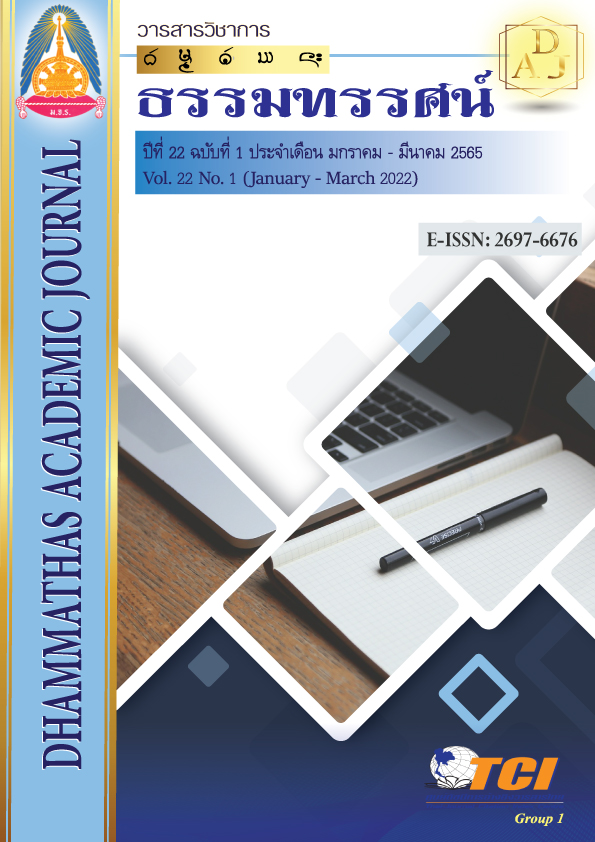Free Democracy and Non-liberal Democracy
Main Article Content
Abstract
This academic article has purpose to study liberal democracy and non-liberal democracy using democratic liberal thinking base as a conceptual framework for analytical study. The results of study were found that firstly, the exercise of state power must be governed by constitutional law giving people the opportunity to express their political opinions criticism of the work of the government and the free movement of political demands in accordance with the principles of rights and liberties whereby the State does not enforce other power to act against its citizens according to the rule of law properly, Secondly, it was found that to use the powers of political leaders to enact laws to block rights and liberties by intervening within the democratic regime in order not to be too constitutional law, but for the people to follow the principles of democratic rights and liberties, to allow the process of political participation in the model of elections only, whereby the government uses absolute authoritarianism both inside and outside the laws to infringe upon the rights and freedoms of the people at all times.
Article Details

This work is licensed under a Creative Commons Attribution-NonCommercial-NoDerivatives 4.0 International License.
เพื่อให้เป็นไปตามกฎหมายลิขสิทธิ์ ผู้นิพนธ์ทุกท่านต้องลงลายมือชื่อในแบบฟอร์มใบมอบลิขสิทธิ์บทความ ให้แก่วารสารฯ พร้อมกับบทความต้นฉบับที่ได้แก้ไขครั้งสุดท้าย นอกจากนี้ ผู้นิพนธ์ทุกท่านต้องยืนยันว่าบทความ ต้นฉบับที่ส่งมาตีพิมพ์นั้น ได้ส่งมาตีพิมพ์เฉพาะในวารสาร วิชาการธรรม ทรรศน์ เพียงแห่งเดียวเท่านั้น หากมีการใช้ ภาพหรือตารางของผู้นิพนธ์อื่นที่ปรากฏในสิ่งตีพิมพ์อื่นมาแล้ว ผู้นิพนธ์ต้องขออนุญาตเจ้าของลิขสิทธิ์ก่อน พร้อมทั้ง แสดงหนังสือที่ได้รับการยินยอมต่อบรรณาธิการ ก่อนที่บทความจะได้รับการตีพิมพ์References
กระทรวงศึกษาธิการ. (2542). ประชาธิปไตย. กรุงเทพฯ: คุรุสภาลาดพร้าว.
เกษียร เตชะพีระ. (2558). แนวคิดเรื่องเสรีนิยมกับประชาธิปไตย (Liberalism and Democracy). กรุงเทพ: มหาวิทยาลัยธรรมศาสตร์.
คำนึง ชัยสุวรรณรักษ์ และธีระพล บุญสร้าง. (2546). ความหมายประชาธิปไตยในวิถีชีวิตไทย. กรุงเทพฯ: วี.เจ.
โคริน เฟื่องเกษม. (2557). สาธารณรัฐสิงคโปร์. ใน หนังสือชุด สถาบันการเมืองใน ประเทศอาเซียนบวกสาม. กรุงเทพฯ: ศูนย์วิจัย ดิเรก ชัยนาม คณะรัฐศาสตร์.
_______. (2554). สิงคโปร์ภายใต้สามผู้นำ. กรุงเทพฯ: เดือนตุลา.
ชลธิศ ธีระฐิติ. (2546). ความหมายว่าด้วยเสรีนิยม. กรุงเทพฯ: พี.เพรส.
ไทยโพสต์. (2563). เสรีภาพการแสดงออกในระบอบประชาธิปไตย. เข้าถึงได้จาก https://www.thaipost.net/main/detail/75250
ธเนศ วงศ์ยานนาวา. (2549). ฐานทางความคิดของประชาธิปไตยแบบปรึกษาหารือ. เข้าถึงได้จาก http://www.kpi.ac.th.
นิยม รัฐอมฤต. (2547). ความหมายประชาธิปไตย. เอกสารประกอบการบรรยาย. กรุงเทพฯ: สถาบันพระปกเกล้า.
พิชิต ลิขิตกิจสมบูรณ์. (2555). ประชาธิปไตยที่ไม่เสรี. เข้าถึงได้จาก https://prachatai.com/journal/2012/08/41881
ฤดีมน ปรีดีสนิท. (2544). หลักการอุดมการณ์เสรีนิยม. กรุงเทพฯ: วิถีทรรศน์.
วรเจตน์ ภาคีรัตน์. (2543). เงื่อนไขการตรากฎหมายจำกัดสิทธิและเสรีภาพของประชาชน: “มาตรา” ในการควบคุมตรวจสอบความชอบด้วยรัฐธรรมนูญของกฎหมาย. กรุงเทพฯ: มหาวิทยาลัยธรรมศาสตร์.
สนธยา พลศรี. (2545). ทฤษฏีเกี่ยวกับเสรีนิยม. กรุงเทพฯ: โอเดียนสโตร์.
สมเกียรติ วันทะนะ. (2555). กำเนิดและความเปราะบางของเสรีประชาธิปไตย. กรุงเทพฯ: สมาคมรัฐศาสตร์แห่งมหาวิทยาลัยเกษตรศาสตร์.
สมชาย กษิติประดิษฐ์. (2547). สิทธิเสรีนิยม. (พิมพ์ครั้งที่ 5). กรุงเทพฯ: มหาวิทยาลัยรามคำแหง.
สมบัติ บุญคำเยือง. (2546). คนบ้านป่า: สิทธิในวิถีปฏิบัติและสิทธิทางวัฒนธรรม. ในพลวัตสิทธิชุมชน: กระบวนทัศน์ทางมานุษยวิทยา. กรุงเทพฯ: ศูนย์มานุษยวิทยาสิรินธร (องค์การมหาชน).
อรพิมพ์ บุญอาภา. (2534). ลักษณะพื้นฐานของอุดมการณ์เสรีนิยม. กรุงเทพฯ: ไทยวัฒนาพานิช.
Case, W. (2010). Contemporary Authoritarianism in Southeast Asia: Structures, Institutions and Agency. London: Routledge Taylor & Francis.
Samuel P. H. (1991). The Third Wave: Democratization in the Late Twentieth Century. Norman: University of Oklahoma Press.
Zakaria, F. (2002). Illiberal Democracy Five Years Later: Democracy's Fate in the 21st Century. Harvard International Review, 24(2), 44-48.
_______. (2007). The Future of Freedom: Illiberal Democracy at Home and Abroad. New York: W. W. Norton & Company.

